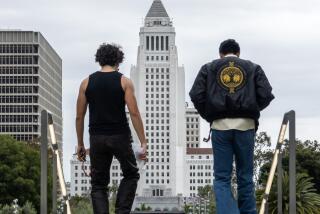THE LOS ANGELES EARTHQUAKE : Death in the Morning: Temblor Takes Its Toll : Man Survived Similar Tragedy in Guatemala but Not in L.A.
- Share via
Ten years ago, a fragile young man named Juan Herrera decided that he had no choice but to make the hard journey from Guatemala to Los Angeles. He left behind a family in ruin, whose modest possessions had been destroyed by an earthquake that killed 20,000 people.
His plan was to find work here and then to send money home to help his folks reclaim their lives and dreams from the rubble. He took a job as a butcher at La Imperial Meat Market on Slauson Avenue in Maywood and lived above the store in a cramped second-floor apartment.
Herrera--”Emilio” to his friends--was a quiet sort, but when he spoke it was sometimes of the images that continued to haunt him from the 1976 killer quake in Guatemala.
“He said it’s something so terrible. You cannot hide anywhere,” his boss and friend, Rufino Racanac, recalled Thursday. “He said he was very scared, and I’m sure that was on his mind this morning.”
At roughly 7:45 a.m., Herrera, naked and wet, fell to his death from a bathroom window in his apartment--a casualty of Los Angeles’ earthquake and, according to friends, his own fears. Transported to County-USC Medical Center, the 32-year-old man was pronounced dead at 10:15 a.m.
Maywood police said the quake measuring 6.1 on the Richter scale pitched him out of an oversized window of frosted glass as he showered. But his friends say that the police are wrong. They point out that the unbroken window had been slid open, that a screen had been pushed aside and that Herrera had often talked about the dangers of remaining indoors during a quake.
“He probably thought it was safer to jump than to stay inside,” Racanac said.
During the Guatemala earthquake, Racanac said, many were crushed when adobe dwellings crumbled on them, a fact of which Herrera was aware.
Herrera had been in the country illegally until about a week ago when he finally obtained a temporary work visa. He was thrilled, said Jose Zepeda, 41, co-owner of the meat market where Herrera was employed for nine years.
“He showed his paper to every customer that came in,” said Zepeda, who often sobbed as he talked about his friend.
Last week, Zepeda said that an emboldened Herrera traveled south past the immigration checkpoint on Interstate 5 for the first time since his clandestine entry into the U.S. from Tijuana.
“He wanted to get stopped at the checkpoint,” said Zepeda, “so he could show them he had his papers. But they didn’t ask.”
Herrera’s friends described him as a “sweet kid” with simple tastes, who seemed skittish and a bit unsure of himself most of the time. The pale green studio apartment he shared with a 47-year-old co-worker had twin beds, one of them a rollaway. Tacked to the walls were a dozen aging posters of women in modest bathing suits.
Herrera’s friends say that he was driven by a hope that he would be able to one day return to his homeland with enough money to start some kind of small business along with his father.
“He loved so much his dad,” Zepeda said.
It is likely, Zepeda said, that Herrera’s body will be shipped home for a family burial.
More to Read
Sign up for Essential California
The most important California stories and recommendations in your inbox every morning.
You may occasionally receive promotional content from the Los Angeles Times.













